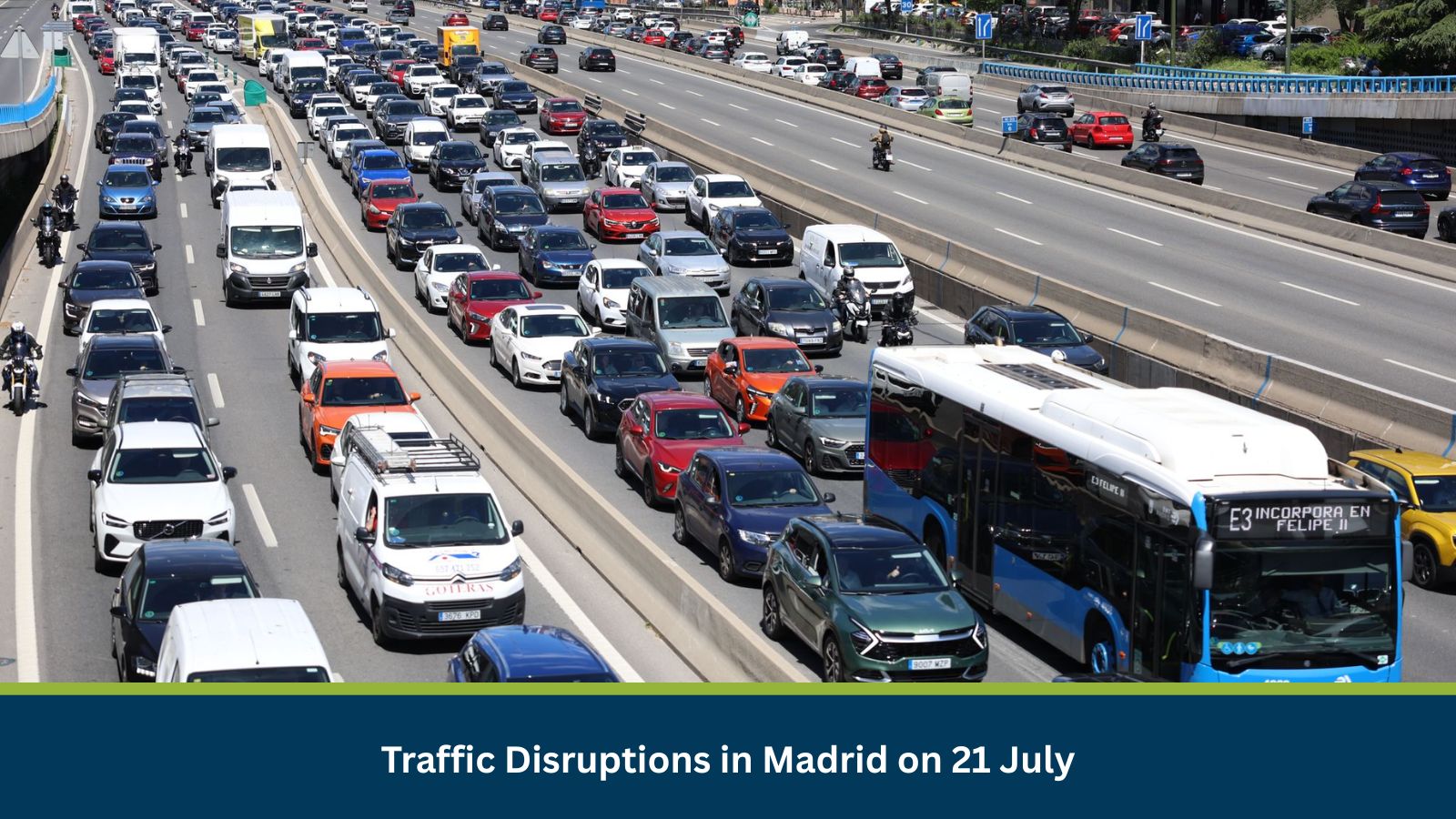This report analyzes the expected traffic disruptions in Madrid resulting from the A-5 highway and M-30 tunnel closures starting on July 21. It provides insights for business continuity planning, personnel safety, and logistical preparedness by evaluating the impact of these infrastructure works.
What is Risk Analysis in the Context of Travel Risks?
Travel risk assessments evaluate how planned events like road closures and large-scale infrastructure projects can impact urban mobility, business operations, and supply chains. They provide timely intelligence that helps businesses prepare for disruptions, mitigate logistical risks, and ensure employee commutes are manageable.
Executive Summary
- Date of Incident: 21 July 2025
- Location: Madrid, Spain
- Risk Category: Travel Risks
- Severity Score: 3/5
- Confidence Level: 90%
A significant infrastructure project involving the undergrounding of the A-5 highway and the closure of access to the M-30 tunnel is set to begin on Monday, 21 July. Based on historical analysis of similar large-scale urban works in Madrid, sustained traffic disruptions are highly anticipated. The immediate impact is expected to last for several weeks, with potential intermittent disruptions extending over 2-3 months as the comprehensive A-5 project progresses. The scale of the affected arteries suggests a moderate to high level of disruption to daily commutes, business operations, and local logistics.
Known Hotspots and Sensitive Areas
- The primary closures will affect the western corridor of Madrid, impacting districts such as Latina and Moncloa-Aravaca.
- Key sensitive areas that will experience increased traffic volume and delays include major transport hubs near Príncipe Pío, the vicinity of the Casa de Campo Park, and areas around the Complutense University campus
- While no direct threats to hospitals or schools are expected, emergency service response times could be indirectly affected by congestion.
Impact on Transportation and Services
- Road Access: The primary closures involve the A-5 highway, specifically the access to the M-30 tunnel from the A-5. Similar past incidents have seen closures on other key arteries like the M-30, A-6, and local tunnels.
- Public Transport: Significant disruption to vehicular traffic is highly probable, especially during peak hours. Commuters using the A-5 and M-30 will face substantial delays. Public transport, particularly the Metro and Cercanías commuter rail services, will likely experience increased demand and potential overcrowding.
- Utility Services: While the ongoing undergrounding works may involve relocating existing utilities, the road closures themselves do not directly cause utility damage.
- Business Operations: Similar past events indicate delays for employee commutes and business travel, disruption to local deliveries, and potential reduction in foot traffic for affected businesses.
Recommended Actions
- Implement flexible work arrangements (e.g., remote work, staggered start times) for Madrid-based employees.
- Conduct an immediate review of all planned logistics operations and deliveries that rely on the affected access points. Proactively re-route vehicle fleets using alternative thoroughfares.
- Develop and execute a proactive client communication plan to inform Madrid-based customers and stakeholders about potential delays.
- Establish a central operational command point to monitor real-time traffic conditions and coordinate internal responses.
Emergency Contacts
- Police: 091, 092
- Fire Department: 080, 112
- Ambulance: 061, 112
- National Emergency: 112
- Official Government Websites:
- Ayuntamiento de Madrid (Madrid City Council): https://www.madrid.es/portal/site/munimadrid
- Dirección General de Tráfico (DGT): https://www.dgt.es/inicio/
- Consorcio Regional de Transportes de Madrid: https://www.crtm.es/
Final Thoughts
The planned road closures are expected to result in sustained but manageable disruption to traffic in Madrid. The primary challenges for businesses will be increased commute times for employees and logistical delays. However, unforeseen complexities in construction could lead to a more severe and prolonged disruption, causing public frustration and significant supply chain bottlenecks. Proactive planning, including flexible work policies and real-time logistics monitoring, will be key to mitigating the impact and ensuring business continuity.
Stay ahead of operational risks with real-time alerts, scenario modeling, and expert advisories.
MitKat helps organisations navigate uncertain times by providing comprehensive insights about the evolving risk landscape. We offer various services including Risk consulting and Security Design, Protective Services, and cyber security services which ensure organisations become Risk Intelligent. Our AI-powered operational risk monitoring tool, datasurfr combined with expert insight enables companies to stay abreast of evolving operational risks and emerging developments.






